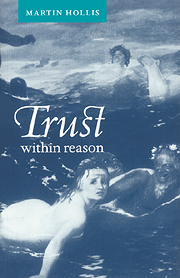1 - The paradox of trust
Published online by Cambridge University Press: 06 January 2010
Summary
John Locke declared trust to be ‘the bond of society’, the vinculum societatis, and we need not doubt him. Everyday life is a catalogue of success in the exercise of trust. Our dealings with friends and enemies, neighbours and strangers depend on it, whether in homes, streets, markets, seats of government or other arenas of civil society. Would you ask a stranger the time unless you could normally count on a true answer? Could you use the highway without trusting other drivers? Could an economy progress beyond barter, or a society beyond mud huts, unless people relied on one another to keep their promises? Without trust, social life would be impossible and there would be no philosophers to try casting the light of reason upon it.
But, although trust is an obvious fact of life, it is an exasperating one. Like the flight of the bumblebee or a cure for hiccoughs, it works in practice but not in theory. When we think about it, the obvious fact that, on the whole, we manage to live together in mutual confidence turns mysterious. In Essays on the Law of Nature, Locke accounted for trust by invoking a divinely ordained ‘rule of morals or law of nature’, which makes us trustworthy when we are acting in conformity with it. This ordinance, discernible through sense experience by the light of nature and binding on us, lets us see what does and does not accord with our rational nature. In the more famous Essay Concerning Human Understanding he made it a matter of appeal to nature without recourse to God's will.
- Type
- Chapter
- Information
- Trust within Reason , pp. 1 - 25Publisher: Cambridge University PressPrint publication year: 1998



